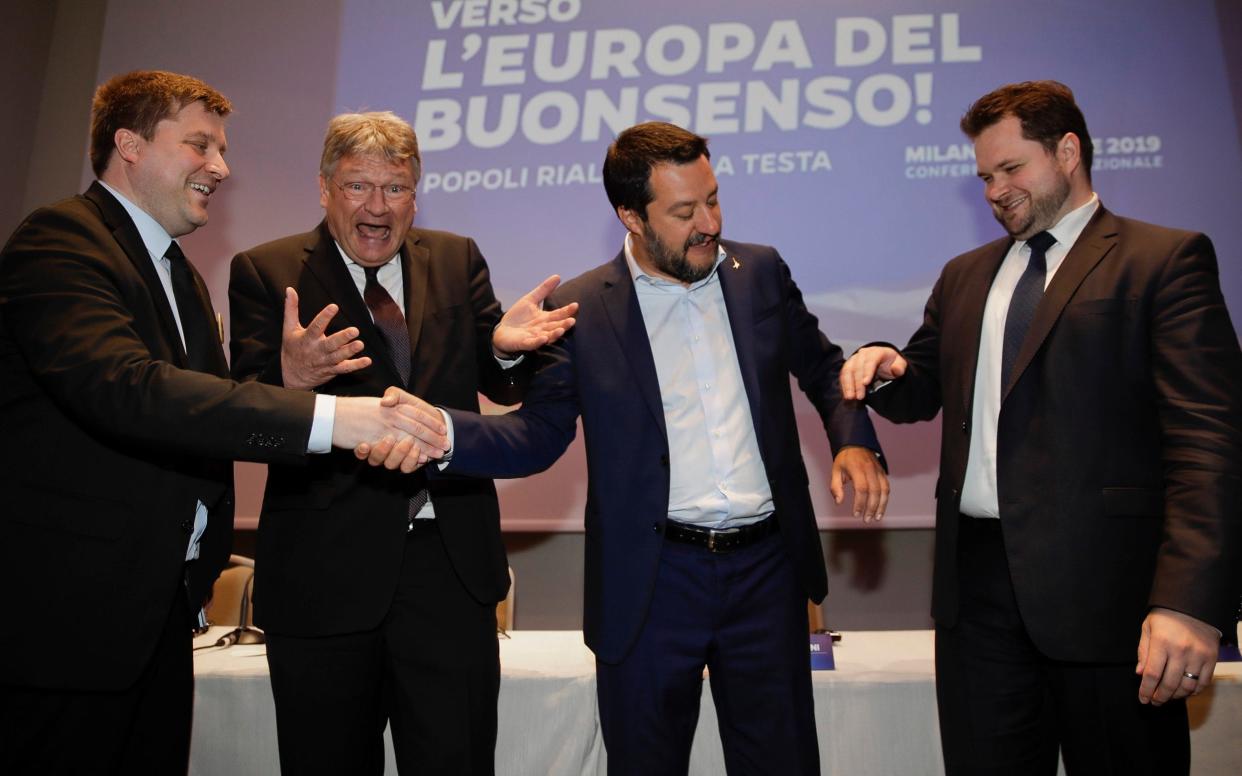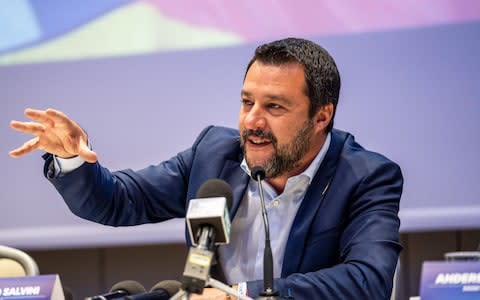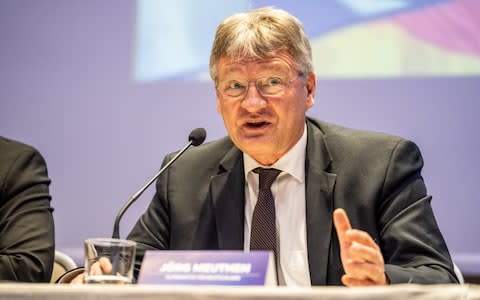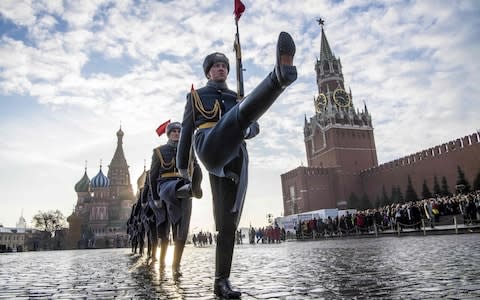Italy's Salvini unveils alliance of hard-Right populist parties to contest European elections

A new alliance of nationalist parties led by Italy’s Matteo Salvini has invited the Conservatives to join them in the event that Brexit is delayed and Britain has to contest the European Parliament elections next month.
The alliance, unveiled in Milan on Monday, consists of Italy’s hard-Right League, the
Alternative for Germany party, which has been accused of whitewashing Germany’s Nazi past, the Danish People’s Party and the Finns Party of Finland.
The group hopes to attract other Right-wing “patriotic” parties in the weeks leading up to the elections on May 26.
“Our aim is to be the biggest group in the European Parliament,” said Mr Salvini, Italy’s most powerful politician.
Anders Vistisen, of the Danish People’s Party, called on the Conservatives to join the new grouping if the UK finds itself contesting the elections.
“This is an open invitation to everyone to have a chat with us, including the Tories if Britain does not succeed in leaving the EU,” he said.
Jörg Meuthen, chairman of the AfD or Alternative for Germany, thought that prospect was unlikely. “I don’t expect the Tories to join us,” he told The Telegraph.

The four parties said their main priorities were to strengthen the EU’s external borders, cut down unauthorised migration to “zero” and claw back sovereignty from Brussels.
“We want to reform the EU without destroying it. Radical changes are needed – more power to our countries and less bureaucracy from Brussels,” said Mr Meuthen.
Asked if he wanted Germany to follow Britain by leaving the EU, he said: “If there are moves towards building a United States of Europe, then we would want to leave.”
He predicted that the new grouping could win as many as 170 seats in the 705-seat European Parliament after next month’s elections. If Britain does not leave the union then 751 seats will be contested.
Mr Vistisen, from Denmark, said the four parties were implacably opposed to attempts by Brussels to work towards a United States of Europe.
“It’s about defending the nation state’s right to find its own path,” he said. “This is the right direction for Europe.”
Mr Salvini would make an excellent head of the European Commission, his new allies said. “But I think he will be needed here in Italy,” said Mr Meuthen.

The AfD has been accused of questioning the Holocaust and glorifying the wartime exploits of the Wehrmacht.
Björn Höcke, one of the party’s more extreme figures, has called for a “180-degree turn” in Germany’s attitude to the Second World War, saying that Germans should stop atoning for the crimes of the Nazis.
Alexander Gauland, another member of the party, said that Hitler and the Nazis “are just bird shit in more than 1,000 years of successful German history."
In January the party was placed under surveillance by German domestic intelligence as a possible extremist threat.
The Danish People’s Party has called for a barbed wire fence to be built along the border with Germany to keep out unauthorised migrants while the Finns Party has described some immigrants, such as Roma gypsies, as “criminals” and has called for the scrapping of the country’s aid budget.
But Mr Salvini denied that any of the parties had sympathies for Fascism or Nazism.
“There are no extremists or nostalgics among us. There is no bad company at this table,” he said, describing critics as “snobs from the radical chic Left.”
“The tired debate over Fascists and Communists does not interest us. We are looking ahead to the future.
“For many people, Europe has become a nightmare, not a dream. We are working on a grand project which will affect Europe for the next 50 years,” said Mr Salvini, who is Italy’s deputy prime minister and interior minister.
He has been accused by his partner in the Italian coalition, Luigi Di Maio of the Five Star Movement, of getting dangerously close to extremists in the new political grouping.
"I'm concerned about this ultra-Right drift at a European level, with political forces that will be part of the League’s group which go so far as to deny the Holocaust in some cases,” Mr Di Maio, also a deputy prime minister, said on Friday.

He questioned the League’s choice of allies again on Monday, saying that it was odd for Mr Salvini to seek a pact with politicians such as Viktor Orban of Hungary after they had continuously rejected calls by Italy and Greece to take a fair share of Europe’s migrants.
“I find it paradoxical, the idea of a European alliance with governments that refuse to accept the redistribution of migrants who arrive in Italy,” Mr Di Maio wrote in Corriere della Sera newspaper.
Countries like Hungary “are the cause of our emergency… countries that ignore and snub us, breaking the rules, lacking respect for Italy and the Italians.”
Mr Salvini is forecast to do well at the elections next month, tapping into Italians’ disenchantment with the EU.
Nearly 50 per cent of Italians would now welcome a Brexit-style referendum on whether Italy should leave the bloc, compared to 28 per cent three years ago, according to a survey published at the weekend by La Stampa newspaper.
The League is predicted to more than quadruple its representation with 27 seats.
The four parties called on other nationalist political parties within the EU to join them in a new European Parliament grouping, the European Alliance of People and Nations.
But noticeably absent from the gathering in a five-star hotel in Milan were some of the leading figures of Europe’s extreme Right, including Mr Orban of Hungary, France's Marine Le Pen and Poland's Law and Justice party.
Policy differences and personal rivalry could make it hard to forge a consensus among Europe’s populist, nationalist parties, which are split between three different parliamentary groupings.
Attitudes towards Moscow are potential deal-breakers – the League and Ms Le Pen’s National Rally are pro-Russia while nationalist parties in Poland, Finland and Sweden see Vladimir Putin as a threat.

